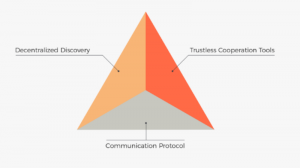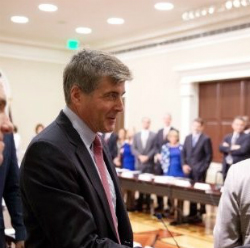

Chris Ballinger, CEO of MOBI commented, “Our approach is open and inclusive and we welcome stakeholders from across the mobility value chain to help build our network. We want to inspire a rapid and scalable adoption of technologies by companies in the autonomous and mobility space and the partnership with the DAV Foundation will help drive this.”
The DAV Foundation
At the DAV Foundation the mission is to promote and support research and development of the DAV Network. This builds on an open-source protocol.
The DAV Foundation launched its DAV Network (DAV) as the first open-source system for transport operating on a global scale. DAV is a framework of:
- open-source software
- open-source hardware
- a free decentralized marketplace where anyone can buy and sell autonomous transportation services.
Its technology consists of three major components:
- decentralized discovery where DAV enables autonomous vehicles to discover each other, service providers, and clients around them; DAV implements decentralized node discovery using a peer-to-peer protocol where nodes list in a distributed hash table for efficient access
- communication protocol: DAV defines a library of standard communication protocols for various transportation scenarios which include: on-blockchain communication by calling smart contracts via through events emitted by those smart contracts and off-blockchain communication performed peer-to-peer using DAV’s protocols
- trustless cooperation tools to enable trust between buyers and sellers of transportation services; achieved using a series of specialized smart contracts, these enable multi-party contracts between buyer and seller plus (when needed), between arbitrator, insurer and others; contracts tie in directly to the DAV token, guaranteeing financial resolution for transactions between multiple parties without requiring any pre-established trust.

Service providers on the DAV Network do not require any prior commercial arrangements between each other. This alone might justify the addition to the MOBI consortium.
Tal Ater, CTO and co-founder of the DAV Foundation said, “MOBI and the companies that are part of the consortium share the same goals as us. It’s about companies working together over trustless platforms, because decentralisation is the key to the future of transportation, globally. MOBI has a fantastic network covering a range of expertise that is going to make this a reality.”
MOBI
MOBI describes itself as “a nonprofit organization working with forward thinking companies, governments, and NGOs to make mobility services more efficient, affordable, greener, safer, and less congested by promoting standards and accelerating adoption of blockchain, distributed ledger, and related technologies.” Its partners include BMW, Bosch, dashride, Ford, GM, Groupe Renault and ZF. IOTA has also joined.
The use cases it lists reflect (as one might expect) the entire mobility services value chain. This includes:
-
-
- digital identity and history
- location in space and time
- supply chain
- congestion fees
- autonomous machine payments
- mobility commerce platform(s)
- driving data markets
- carbon pricing
- car and ride sharing
- usage based insurance
- usage based taxes
- pollution taxes.
-
The DAV Foundation and MOBI
Blockchain technology continues to play an important part in the development of autonomous vehicles’ ecosystems. This partnership between the DAV Network and MOBI should help unite and decentralise every element across both networks, including:
-
-
- car and ride sharing
- charging stations
- autonomous payments
- pay-as-you-use insurance
- taxes.
-
The key to all different dimensions will be smart contracts. All aspects will be governed by smart contracts secured on the blockchain.
Enterprise Times: what does this mean
The DAV Foundation joins industry peers in MOBI. Together these organisations account for over 70% of global vehicle production by market share. As important, the MOBI consortium includes automakers, public transportation providers, energy companies, insurance firms and regulatory bodies.
The mobility/blockchain scene would now seem set for rapid innovation. A disparate collection of initiatives comes together and solidifies. The common themes are future mobility, blockchain and smart contracts.
As commented elsewhere in Enterprise Times, there are four primary criteria – in the view of Enterprise Times – for blockchains to have a chance for success. These are:
-
-
- a narrow, well-defined business problem
- existing slow, complex and paper-based processes
- many participants
- multiple organisations, all of which need reliability and transparency.
-
MOBI with the DAV Foundation fits this bill. The question is, with so many participants: will the solidification mean progress or bureaucratic-induced stagnation?
























